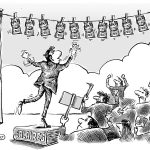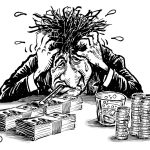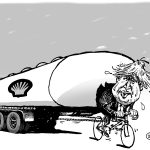Protectionist contagion
Reclaiming economic sovereignty, protecting jobs … The virus of protectionism is spreading in doses that are less and less homeopathic.
The evidence is more striking every day: the Covid-19 crisis has only accelerated trends already at work previously. Among these, the protectionist contagion has gained further ground. As we have already mentioned, the Covid-19 is only “the prolongation of the Sino-American trade war by other means1[1]“. Donald Trump, now lagging in polls for his disastrous management of the pandemic, is increasing the pressures on China, but also on Europe. There was a new round of blacklisting Chinese companies considered to be under the influence of the army, the US withdrew of discussions on international taxation of GAFA etc. For the American president in the campaign, the theme is promising enough for him to go so far as to suspend H1-B temporary work visas for qualified people, this time in the name of job protection and national workers.
What States seemed to have avoided in the aftermath of the 2008 crisis will come back in big strides. The pandemic and containment have caused a major contraction in world trade. The WTO estimates that freight traffic could collapse from 13% to 32% this year. Resumption of trade will be crucial to sustain global activity.
Many of our governments intend to promote the repatriation of certain productions.
The report of the European Commission for the year 2019[2], underlines the general rise in protectionism. Unsurprisingly, China ranks first among the most closed countries, while the United States is showing more and more intransigence. EU efforts to open up third markets are producing some tangible results that can be measured in billions of euros. They are nonetheless modest in term of the stakes. In addition, its objectives still lack support and allies: promotion of multilateralism, climate and digital transition, technological security and protection of intellectual property.
Faced with these challenges, Europe will have to navigate between growing external pressures and internal complacency. From the start of the crisis, the Union was quick to strengthen measures to protect vulnerable companies against predator investors from third countries. Likewise, within the Union, competition authorities have been quick to relax the rules on state aid control. They have also facilitated so-called “lawful” cooperation between European companies, who would not be running the risk of being convicted of cartels or abuse. These emergency measures, if they were to be maintained would eventually challenge in the long run the principles which govern the organization and regulation of competition within the Union. Even after the reopening of the Schengen borders, the expected rise in unemployment reinforces the temptation to question the principles of free movement of goods and people.
During the pandemic, the question of health sovereignty became particularly acute. Taken aback, many of our governments now intend to promote the repatriation of certain productions and secure the supply chains considered essential. We cannot blame them. However, how are they going to do it? At the end of the crisis, what will happen to the exceptional measures implemented and so costly? In the name of consumer and job protection, what will be required in return for public emergency aid? Operating conditions? Constraints on recruitment policies? Location requirements? Vis-à-vis third countries, Europe must protect itself and fight for commercial reciprocity, and a “level playing field”, but will the Union risk to fragment from the inside by resorting reflexes as old as ineffective in rejecting competition and withdrawing into oneself? This has been demonstrated several times over: the absence of competition and the closing of borders, like devaluation, produce scarcity of supply, raise prices for consumers and cause job losses.
The “made in my country” flourishes everywhere. The publicists have well understood the trend, which, at ad length, makes us swallow “local” and “produced here”. It’s all the better if it results from greater competitive efficiency on the part of our producers. It is much more damaging if it is the result of monopolies sheltered from new barriers.
By focusing on short-term protection, we risk making the wrong choices and sacrificing the dynamic of entrepreneurship on the altar of recovery.
Original in French @ allnews.ch® June 30th edition
Cartoon by ©Barret



